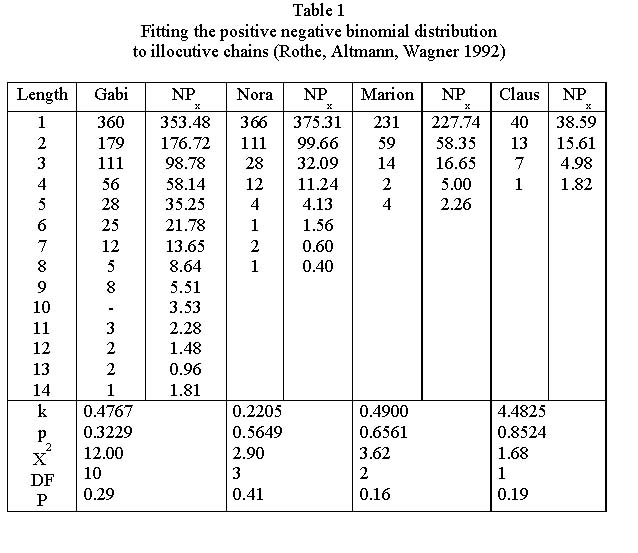Speech act length
1. Problem and history
Illocutive speech acts have different length in conversation. Their length is measured in terms of the number of different acts of a participant in uninterrupted sequence. The length of illocutive speech acts is part of the dynamics of discourse. The only approach has been made by Rothe, Altmann and Wagner (1992) analyzing a German polylog of two children and two adults. The following example illustrates the analysis of the text (Gabi is child, Marion is adult):
Gabi
/Zeig.Hinweis/
Marion
/Anfrag/
/Anred/
Gabi /Feststell/
/Appellier (Zustim)/
Marion
/Zustimm/
Gabi
/Behaupt.Vergleich/
Marion
/Feststell.Widersprech/
Gabi
/Bejah/Recht-geb/
/Ueberleg/
/Behaupt.Ueberleg/
/Behaupt.Vergleich/
2. Hypothesis
Speech acts abide by the usual length distribution following from the unified theory ( ).
).
3. Derivation
In the usual “length”-approach,  , one inserts g(x) = (a+bx)/(cx) and solving for x = 1,2,… one obtains the positive negative binomial distribution
, one inserts g(x) = (a+bx)/(cx) and solving for x = 1,2,… one obtains the positive negative binomial distribution
(1)
Example: Illocution chains in a German polylogue
Rothe, Altmann and Wagner (1992) fitted the negative binomial distribution to the length of illocution chains of two children (Gabi, Klaus) and two adults (Marion, Nora) from the Dortmunder Korpus of spontaneous children speech (s. Steinsträter 1988) and obtained the results in Table 1. As can be seen, all fittings are satisfactory. The parameter p symbolizes probably the hierarchy of speakers: the greater p, the more peripheral is the role of the speaker in the polylogue.
4. Authors: U. Strauss, G. Altmann
5. References
Rothe, U., Altmann, G., Wagner, K. (1992). Verteilung der Länge von Sprechakten in der Kindersprache. In: Wagner, K.R. (Hrsg.), Kindesprachstatistik: 47-56. Essen: Die blaue Eule.
Steinsträter, Ch. (1988). Zur kindlichen Sprachhandlungsfähigkeit: Analyse eines Korpus spontaner Sprechsprache einer Fünfjährigen. Dortmund: Diss.
Wagner, K.R., Steinsträter, Ch. (1987). Wörterbuch der illokutiven Typen zum Korpus Teresa. In: Wagner, K.R. (Hrsg.), Wortschatz-Erwerb: 59-81. Bern: Lang.
